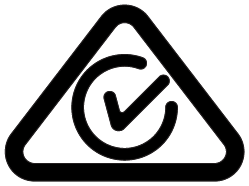
ACMA audited solar inverters for electromagnetic compliance. The worst thing they found? Missing stickers.
We’re so accustomed to seeing electrical products with compliance stickers and certificates, it’s a safe bet that most of us barely notice them. So here’s a handy reminder that those stickers and certificates matter.
Nearly a year ago, the Australian Communications and Media Authority (ACMA) audited the electromagnetic interference compliance of solar inverters from manufacturers that carried Clean Energy Council approval.
And action was taken as a result of that audit – not because the ACMA found products that didn’t meet interference or safety standards, but because ACMA found six of the nineteen manufacturers could not provide the correct compliance documentation and one did not have the correct “Regulatory Compliance Mark” (RCM) sticker on its products.
This wouldn’t count as “news”, except as far as I could tell, it received no attention at all – apparently in a world (still) with its attention fixed on COVID-19, the ACMA’s investigation slipped by just about everyone.

The ACMA Regulatory Compliance Mark (Source: ACMA)
For installers, the important thing about the audit is that products must not be sold in Australia unless they’re certified as confirming to technical requirements – and they carry the approved label demonstrating compliance.
In last year’s audit, out of the 66 manufacturers that have CEC approval, the ACMA selected 50 inverter models from 19 separate suppliers for the audit.
The good news is this industry is behaving itself when it comes to electrical safety and electromagnetic compatibility (that is, inverter makers offer safe products that are pretty good at keeping their electromagnetic noise to themselves).
Some manufacturers needed a reminder about EME labelling and/or documentation, though:
“However, the audit also revealed an overall lack of supplier awareness around the need for compliance with the EME labelling requirements when the solar inverters were incorporated with a radiocommunications transmitter such as wi-fi, Bluetooth and/or a 3G/4G modem.”
And while seven suppliers received warning notices from the ACMA over non-compliant documentation, the organisation told SolarQuotes this week everybody set things to rights without further action.
“As the issues identified have been rectified by the suppliers concerned, the ACMA was satisfied that the relevant record-keeping requirements have now been met for the audited devices. The audit is considered complete.”
Keep It Quiet
If you experience it, radio interference from any active electronics can drive you nuts. I’ve gone through it with a since-retired inverter. It spoiled my enjoyment of the 2018 cricket season, since the sounds it leaked onto my mains was a rising and falling tone; which I guess may have been associated with rising or falling current from the roof or into the battery.
My experience is probably unusual, since the ACMA didn’t have to hit anybody with penalties or even threats over actual interference – the Authority only had to make some suppliers more aware of their documentation and labelling responsibilities.
The last time the ACMA looked at solar inverters was in 2010, and since then, the biggest change in the solar business has been the advent of modern communications capabilities in inverters. Instead of the serial ports offered by my first inverters (Outback Power Systems units), a modern inverter might have Wi-Fi, Bluetooth and 3G/4G mobile data ports.
All of these are potential sources of electromagnetic interference, so it made sense for the Authority to run its eye over the industry.
The ACMA also cited the 2013 introduction of a national shared database of suppliers (via the Electrical Regulatory Authorities Council) and the maturation of the industry (including the creation of the CEC) as factors in its decision it was time for another audit.
Safety In Communications Equipment
Interference (EMC) is covered by the Radiocommunications Labelling (Electromagnetic Compatibility) Notice 2017, while the ACMA’s Electromagnetic Radiation (EME) regime ensures that if devices have transmitters (Wi-Fi, Bluetooth or mobile data, for example) they comply with the exposure limits set by the Australian Radiation Protection and Nuclear Safety Agency (ARPANSA).
In short, transmitters that give inverters a wireless connection to the outside world have to keep their signals low enough that they pose no threat to health. The standard is discussed here.
Peoples’ exposure to electromagnetic radiation under the standard has to be kept below 2 and 10 Watts per square meter (for devices designed to be held close to the body, like mobile phones and laptops, the limit is expressed in Watts per kilogram – 0.08W/kg).
The ACMA audit did not include independent testing of devices – the Authority focused on reviewing manufacturers’ test reports and/or technical construction files.
The full report is here (PDF). The ACMA explains its rules for suppliers here.

 RSS - Posts
RSS - Posts



Lie in title, you’ll only find out at end of article with, “The ACMA audit did not include independent testing of devices – the Authority focused on reviewing manufacturers’ test reports and/or technical construction files.”
It was an audit of whether or not the companies had done the testing they were required to. As the audit found they had and they had passed, the title is accurate. An audit is quite different from independent testing, but it’s hard to fit that kind of caveat into a title.